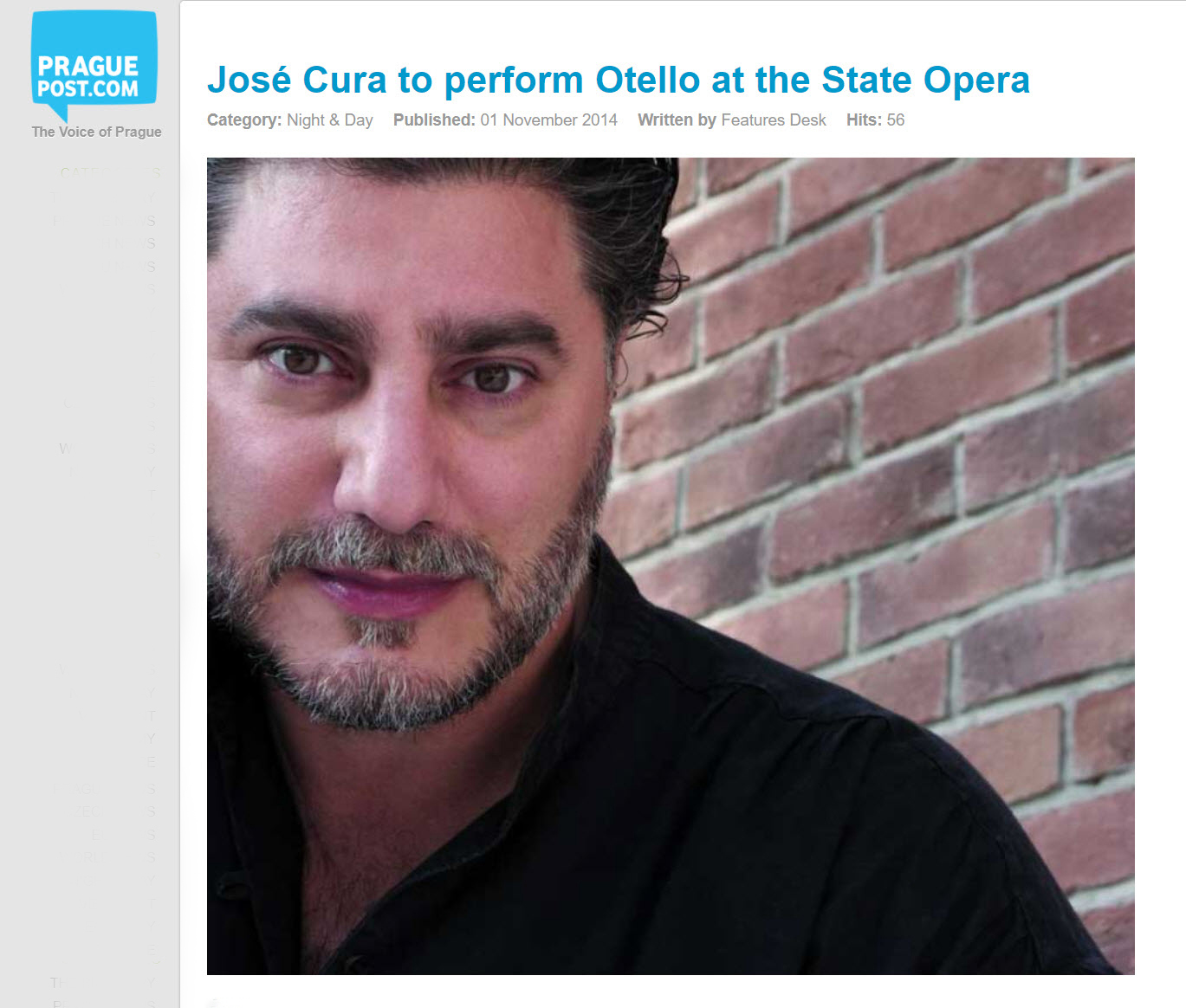
Bravo Cura
Celebrating José Cura--Singer, Conductor, Director, Composer
Operas: Otello
Otello - Prague - 2015
|
|
Otello in Prague
Cast
Giuseppe
Verdi:
Otello
Conductor:
Martin Leginus
Director:
Dominik Neuner
Set:
Vladimír Nývlt
Costumes:
Josef Jelínek
Otello
– José Cura
Desdemona – Eva Hornyáková
Jago – Richard Haan
Cassio – Richard Samek
Emilia – Jana Horáková Levicová
Roderigo – Václav Sibera
Lodovico – Oleg Korotkov
Montano – Ivo Hrachovec
Herold – Libor Novák

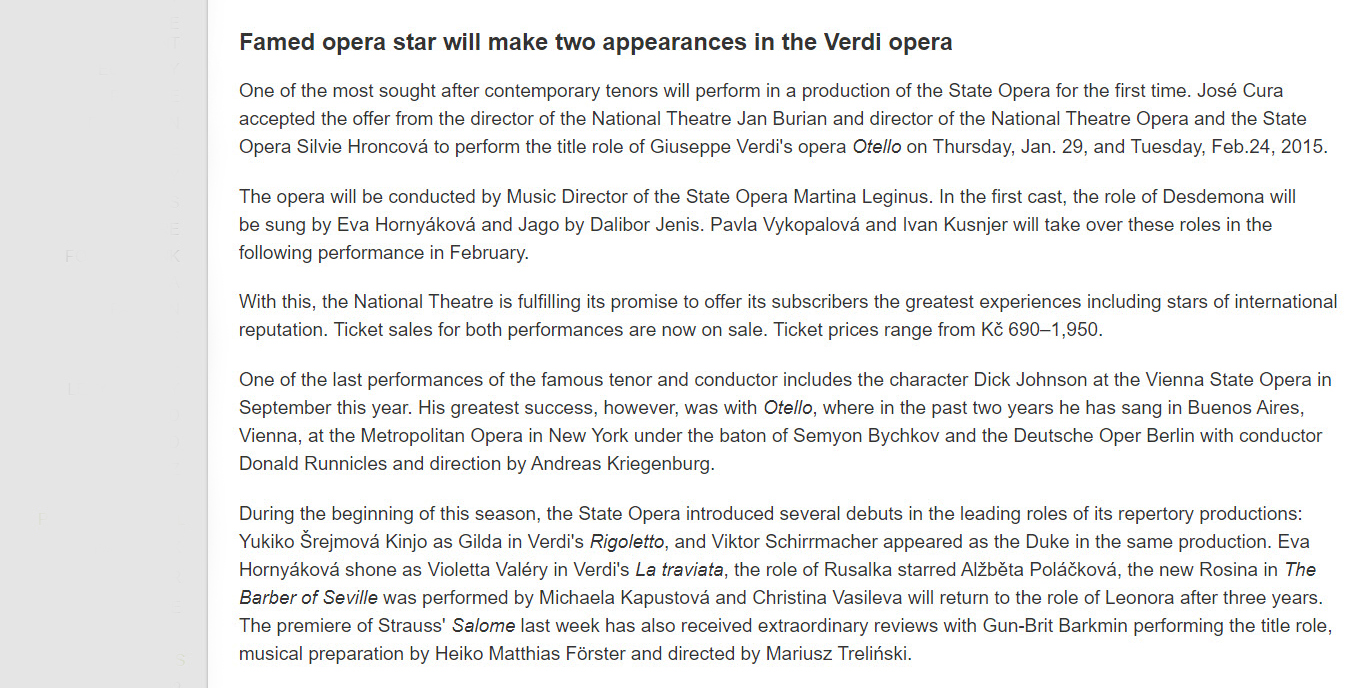
Tenor José Cura will perform for the first time at the Prague State Opera, performing as Otello Český rozhlas 29 January 2015
|
||||
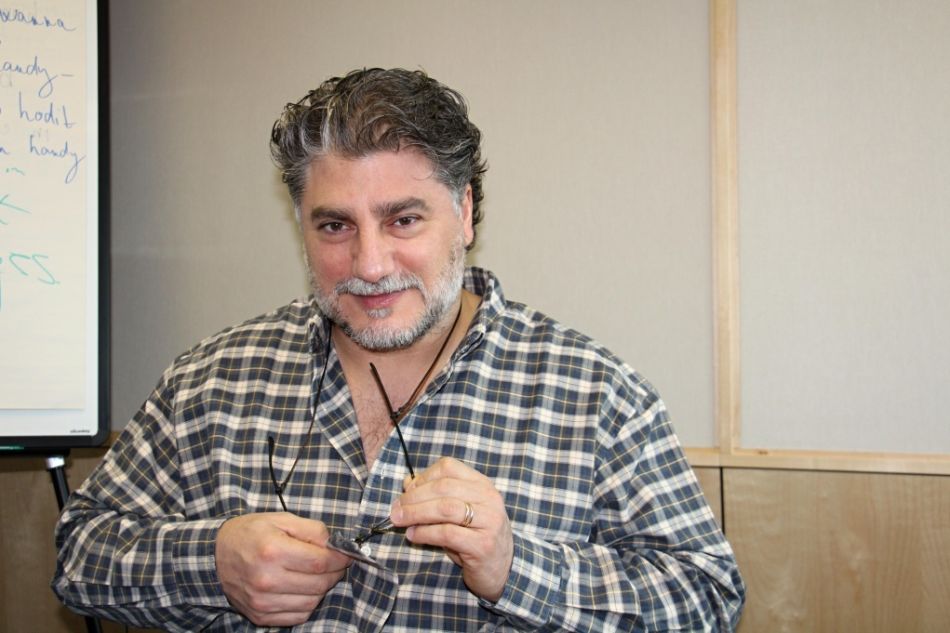
José Cura Will Perform Twice in Prague as Otello Opera Plus / Reuters 27 January 2015
|
||||
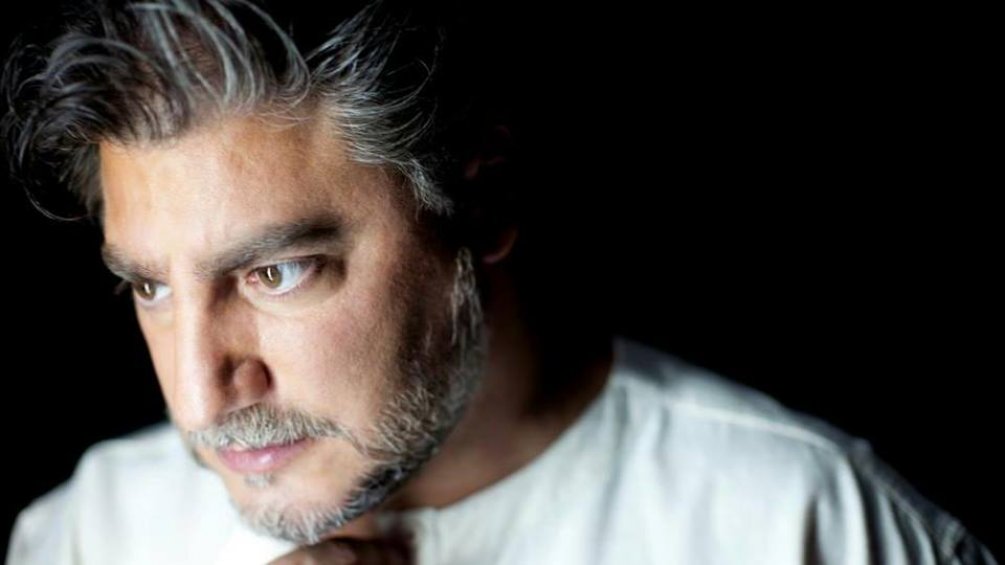
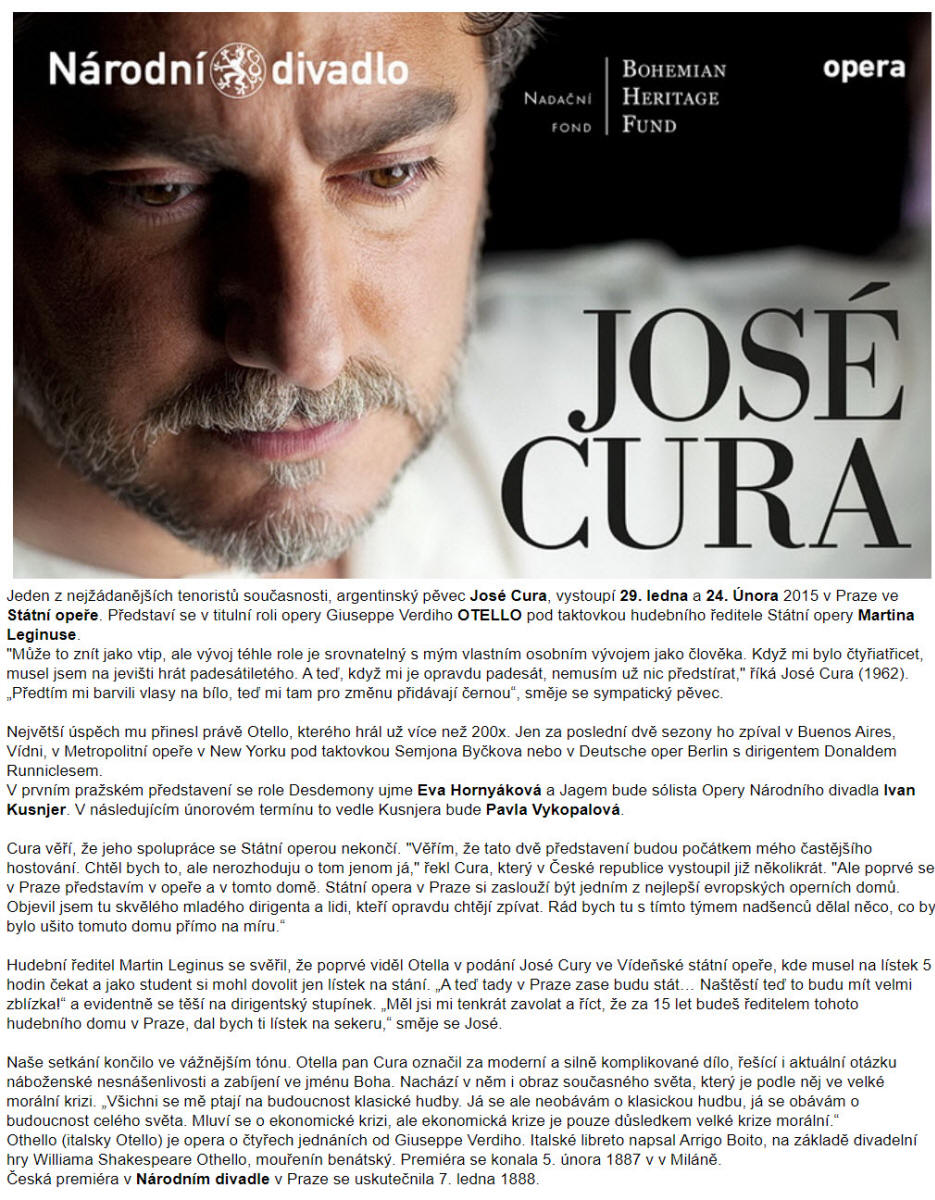
José Cura Scena [Excerpt] One of the most sought-after tenors of today, the Argentine singer José Cura, will perform on January 29 and February 24, 2015 at the Prague State Opera. He will perform in the title role of Giuseppe Verdi's opera Otello under the baton of the music director of the State Opera Martin Leginus. "It may sound like a joke, but the development of this role is comparable to my own personal development as a human being. When I was thirty-four, I had to play a 50-year-old on stage. And now that I'm really fifty, I don't have to pretend." Cura (1962). "Before, they dyed my hair white, now they add black to it for a change," laughs the sympathetic singer. Otello, whom he has played more than 200 times, has brought him the greatest success. In the last two seasons alone, he sang it in Buenos Aires, Vienna, at the Metropolitan Opera in New York under the baton of Semyon Byckov and at the Deutsche Oper Berlin with conductor Donald Runnicles. Cura believes that his collaboration with the State Opera will not end. "I believe that these two performances will be the beginning of my more frequent guest appearances. I would like that, but it's not just me who decides on it," said Cura, who has performed several times in the Czech Republic. "But for the first time in Prague I will perform at the opera and in this house. The State Opera in Prague deserves to be one of the best opera houses in Europe. I discovered a great young conductor and people who really want to sing. I would like to work here with this team of enthusiasts, in something that would be tailor-made for this house. " Music director Martin Leginus confided that he had first seen Cura’s Otello at the Vienna State Opera, where he had to wait 5 hours for a ticket since as a student he could only afford a standing ticket. "And now I'm going to stand here in Prague again - Fortunately, now I'll be very close!" And obviously looking forward to the conducting podium. "You should have called me then and said that in 15 years you would be the conductor of this music house in Prague. I would have given you a ticket," laughed Cura. Our meeting ended in a more serious tone. Mr. Cura described Otello as a modern and highly complicated work, addressing the current issue of religious intolerance and killing in the name of God. He also finds in it a picture of the contemporary world, which according to him is in a great moral crisis. "Everyone asks me about the future of classical music. But I'm not worried about classical music, I'm worried about the future of the whole world. There is talk of an economic crisis, but the economic crisis is only the result of a great moral crisis.”
|
||||
Press and PR Photos
|
|
|
||||
I Am Only Beginning to Discover Otello! Český rozhlas Markéta Kaňková January 29, 2015
On the stage of the Prague State Opera on 29 January will be one of today’s most sought-after tenors. Argentine José Cura will perform as Otello in the Giuseppe Verdi opera; it is the role for which he has earned aworld-wide reputation
Absolutely not! Rather the opposite. I would say my Otello is only just beginning to emerge. After twenty years of knocking on his door, he has finally opened the door and let me in. I am slowly getting into his head, penetrating the finest vibrations of his soul to discover the motivations for his actions. Also, the context of this drama is incredible, not only Otello but every character in the play is exceptional. Personally, I am fascinated by how well Verdi hit the drama, how much he tried to understand the the character of Otello and how he was able to show that understanding in his music. All of this is absolutely clear from his letters. Verdi created in Otello a fantastic, emotionally profound work that is still a source of inspiration and joy to me even after twenty years. Otello is perceived primarily as a play about love, jealousy and revenge. As a Shakespearean tragedy it seems remote from the problems of our contemporary world. Do you see some parallels in the drama in the present day? For you, is Otello a modern drama? Is Otello modern? I will ask you a few questions, and if the answers are “yes” it will also be the answer. How common is it today for people to cheat and betray us? To succeed in politics or another career at any price? Is it modern today for Muslims or members of other faiths to kill in the name of God? How modern and contemporary is the issue of domestic violence? How often do we hear of dead lovers or mistresses? And all this is part of Otello. So how modern is Otello? You have outlined a number of serious problems of today. Among other things, religious intolerance is perhaps one of the main problems of the contemporary world. Do you think you can anything about that through art? Can artists change anything? I firmly believe that as artists we are ambassadors of beauty. We have a great responsibility to keep the atmosphere in society at the highest possible level. But it is hard nowadays to convince people of the beauty of opera, ballet, or painting when in the news the day after visiting a theater or gallery we read that three fools broke into a newsroom and killed all the journalists. Or that a girl of twelve hid a bomb under her dress, went to a supermarket and exploded it and killed two hundred people. I think that under the circumstances, we have an obligation in spite of everything to keep creating and making art, but we have to stop thinking that we artists are the center of the world. I am often asked the question if I’m worried about the future of opera and classical art. It is a question that is irrelevant. If we continue doing what we are doing what we are doing now—hating, killing, making war—then no one is going to make time to go to the theater or have an interest in art. So the answer is clear: let’s make art something that is not outside reality, but a part of it. Then we have a chance to change something. Let’s talk for a moment about you as a theater performer. You are not only an opera singer but also a showman who seems to take—regardless of the role you sing—enormous pleasure from contact with the audience. Is that the main reason you go on stage, to communicate with people, to transfer energy through music? About twenty years ago an American magazine wrote about me that Mr Cura should realize that art was not invented for his pleasure. It was after a concert that I very much enjoyed. And I passed my own pleasure along to the audience. That critic might believe I should speak with the face of someone who has just returned from a cemetery, with a straight face and tortured soul. But this is a huge mistake. I think that the artist should have joy in his work and thank God for it. He should do what he can to transmit positive energy to the audience. And this is what I am trying to do through music and what I definitely want to keep doing. We have the great opportunity to see you in the role of Otello on the stage of the Prague State Opera. You have mentioned you would like to return to Prague again in the future. In what form, what performance, what role? It honestly does not matter to me. I received an invitation to the State Opera and any further cooperation depends on the management of the theater. I sincerely regret that we have just two days for Otello rehearsals. In two days, you can only soak up the possibilities, the potential of people and places, but you can’t develop it. In any case, I am excited to be at the Prague State Opera. Artistic director and conductor Martin Leginus is a professional, I collaborate well with the Czech soloists and chorus, there is a good working atmosphere. Because of all this, I would like to come back to Prague. Can you be more specific? We know you not just as a singer but also as a conductor and opera director. It would be great if you did a project in Prague where you could be a figure in all these roles. I’d hate to be guilty of any incorrectness, but that is exactly what I would like. Of course, it would be great if I could come to Prague next time just as a singer but I would like to work with the local musicians and all the artistic components of the State Opera as a conductor, as a director, as an artist. It would please me greatly to do a complex artistic project in Prague. But who knows? We will see!
|
||||
José Cura: Without Prague my Artistic Pedigree in Not Complete
eskatelevize
“For me, it is very important that I can finally sing for the first time in Prague at the State Opera. It is inconceivable that I sang in almost all the theaters in the world and never in Prague. My artistic pedigree was not complete. I needed it. I needed to be in Prague and I am really enjoying every minute of this job,” he said. Otello is like a marathon According to Cura, Otello is a highly complicated masterpiece that is also essentially a modern work. The violent and frustrating story is a picture of the contemporary world, which is in great moral crisis: “I don’t like the story but that is what it tells you. It is a story of betrayal, jealousy, soldiering, apostasy, about a lot of the negative elements that Shakespeare used to denounced them. In this sense, the opera, or better, the drama, is always current.” Otello is also a very challenging musically. “It’s like you run a marathon. The best marathon runners are not the youngest but most experienced. Because they know how to handle those forty-two kilometers. If you run the first two kilometers at full throttle, you are not going to make it to the second half. In Otello, it is the same. You have to cleverly pace the tempo to master this very difficult role until the end,” said the renowned tenor. . A second performance will be held on February 24. Cura believes that his work with the State Opera will not end there: after the reconstruction in 2016 he would like to be involve with the staging of a work worthy its history and fame.
|
|
||||
Rehearsal Photos
|
|
||||||||||
Otello – José Cura at the State Opera for the First time Harmonie 11 February 2015 Markéta Jůzová [Excerpts] The famous Argentine tenor José Cura, after accepting the offer made by National Theater Director Jana Burian and the Director of the National Theater and State Opera House Silvie Hroncove, came to the stage of the State Opera on 29 January 2015 as the star in a production of Verdi’s opera Otello, in a role which the singer has performed in prestigious venues around the world. In the opera history of Czech theater, however, the first notable collaborations with the famous singer came earlier in new productions developed by the Theater of South Bohemia in České Budějovice and Český Krumlov International Music Festival. From 5 thorugh 10 August 2011, Cura portrayed Canio in the Ruggiero Leoncavallo verismo opera, Pagliacci, under the direciton of Josef Průdka at the Revolving Auditorium in Český Krumlov. The following season he appeared in a production of Otello at the Slovak National Theater in Bratislava under the same director. And even though Cura had not yet sung opera in our town, the orchestra knew him from an earlier time when he sang Radames in Verdi’s Aida during a 2001 tour through Japan with the Prague State Opera. This year he joined the production originally staged in 1991 by director Dominik Neuner who works primarily in Germany and conductor Martin Turnovksý. The work became a hit but in 2009 the opera was restaged by Lubor Cukr and Heiko Mathias Förster. Cura, while stressing his pleasure at being on the stage of the State Opera, admitted his frustration with the directorial concept of the work. Conductor and Music Director of the State Opera Martin Leginus expressed admiration for Cura’s work and stated that having the famous singer perform brought great benefits to the house. Both suggested they were open to possible collaboration on other interesting opera projects in the future.
José Cura was surrounded by the Czech-Slovak opera team and at the same time exposed to both the professional pressures and minimal rehearsal hours. In Prague, he admitted that he had not even receive a recording of the performance on DVD from the theater before the planned evening; he entered into a relationship that was more complex and hectic than before. He thus entered a more hectic and complex situation than, for example, before the premiere of Pagliacci in Český Krumlov, where he knew the directorial concept in detail well in advance. The singer knows from joint cooperation that that many of the Czech orchestras are very good; however, the State Opera Orchestra was not an equal partner for Cura, although at times during the course of the evening and under the leadership of Martin Leginus it was able to play very romantically and impressively. At the level of phrasing, suggestive wording arching across the melodies and dynamism are areas, the players in the orchestra and the conductor could learn from sensitive listening to great singers. Cura is famous for his dark tenor voice but in Prague the lyrical passages of the arias were sung in a clear and bright, though muted, voice. In confrontations with Desdemona, the Slovak soprano Eva Hornyákovou, Iago, (Richard Haanem), and Cassio (Richard Samkem), he approached the title role with a great deal of emotion, talent, and a firm grasp of the interior psychology of the character, which was presented on stage with fine facial details and precise gestures that offered clear testimony about the current emotional state and his relationship to his surroundings. In front of the audience Cura masterfully, uniquely and, above all, naturally portrayed this complex character and set a high standard of incarnating opera characters for his colleagues. A huge ovation, with waves of applause and screams of Bravo, rewarded him at the end of the fourth act.
|
||||
|
|
|
||||
Attempt at Worldliness Harmonie Lubos Stehlik
|
||||
Performance
|
|
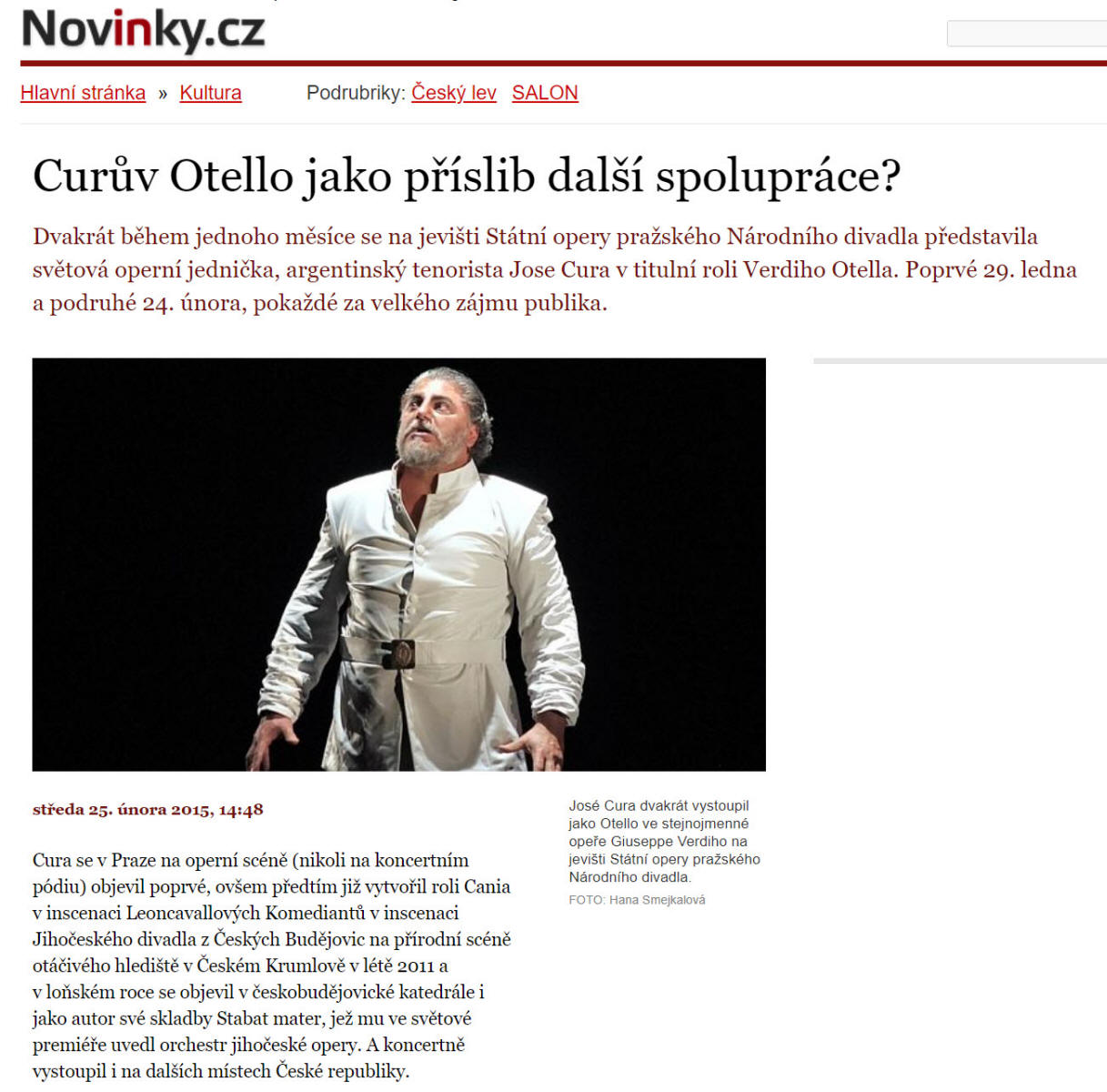
Is Cura’s Otello a promise of further cooperation? Novinky Radmila Hrdinova 25 February 2015 Twice in one month the Prague National Opera at the State Theater has presented one of the opera world’s leaders, Argentine tenor José Cura, in the title role of Verdi’s Otello. First on 29 January and then again on 24 February, each performance was of the greatest interest of the audience. Cura appeared in Prague for the first time on an opera stage (rather than on a concert stage) but he has already appeared at the Revolving Theater in Český Krumlov during the summer of 2011 in the role of Canio in Leoncavallo’s Pagliacci and last year appeared in the cathedral in České Budějovice as the author of Stabat Mater, when the work had its world premiere with the South Bohemian Opera Orchestra. He has also performed in concerts in other locations around the Czech Republic. Otello is one of Cura’s greatest roles and he has sung it on many stages around the world for almost twenty years. And as he said in the press conference prior to his first performance here, he is still developing the character. His Otello, as shown in Tuesday’s performance, is a mature man who initially seemed reluctant to believe in his own happiness and in the tender night scene (act I) with Desdemona it is evident from his words that he could die happy in this singular moment. Even with the unexpected change in the tragic assumption of Desdemona’s infidelity unbalancing the man, the depth of his pain is indicated in gesture, facial expression, and especially his voice rather than by wild running around the stage as has become customary in some interpretations. And his killing of Desdemona is the act of a man who has returned from hell with a horrible decision, and even though at the moment of execution he is absolutely convinced of its righteousness, he cannot resist affection towards the woman he loves so deeply. At the start of the performance on Tuesday it seemed José Cura was not entirely on form, or that his voice could no longer exhibited the strength and brilliance it once did. As the performance continued, however, his singing brightened and he soon convinced that his Otello is still an extraordinary experience. Initially, the resounding voice permeated by emotions told more about the character than just well-sung notes. Cura is always willing to sacrifice smooth and flowing sound for persuasive expressiveness, his voice sounding hoarse and strangled with jealousy and rage. And he is particularly impressive in the poignant conclusion over the dead Desdemona, bitterly aware of his guilt. However, director Dominik Neuner's 1991 production (revived six years ago by Lubor Cukor), with its austerity and the now almost untraceable trace of Neuner's former direction, does not give him much opportunity or inspiration to act out the characters and relationships. […] The Orchestra and Chorus under the direction of Martin Leginus had some better and worse moments, primarily with the imperfect interplay of the choir and the orchestra. Cura had a great success in Prague and it would certainly be beneficial to have him return, especially if he—as he suggested during the press conference—he had the opportunity to stage an original opera production in Prague.
|
||||
|
|
|
|||||
|
|
|
|||||
Curtain Call
|
|
Eye-Witness Reviews
|
|
|
||||
Otello - Budapest - 2015
|
|
|
José Cura sings Otello, his iconic role three times at the Opera MTI translated by Zsuzsanna
|
|
The Making up of Otello
|
José Cura: “I feel young at heart”
Fidelio Rita Szentgyörgyi 11 February 2015
|
||||
|
Production Photos
|
|
Giuseppe Verdi OtelloPerformance Dates: 8 & 11 February 2015 Opera in three parts, in Italian with Hungarian and English surtitles
Conductor - Marco Comin Otello - José Cura Desdemona - Polina Pasztircsák Iago - Anatolij Fokanov Emilia - Veronika Dobi-Kiss Cassio - Zoltán Nyári Roderigo - Gergely Boncsér Montano - Sándor Egri Lodovico - Ferenc Cserhalmi Herald - Géza Ferenc Zsigmond
|
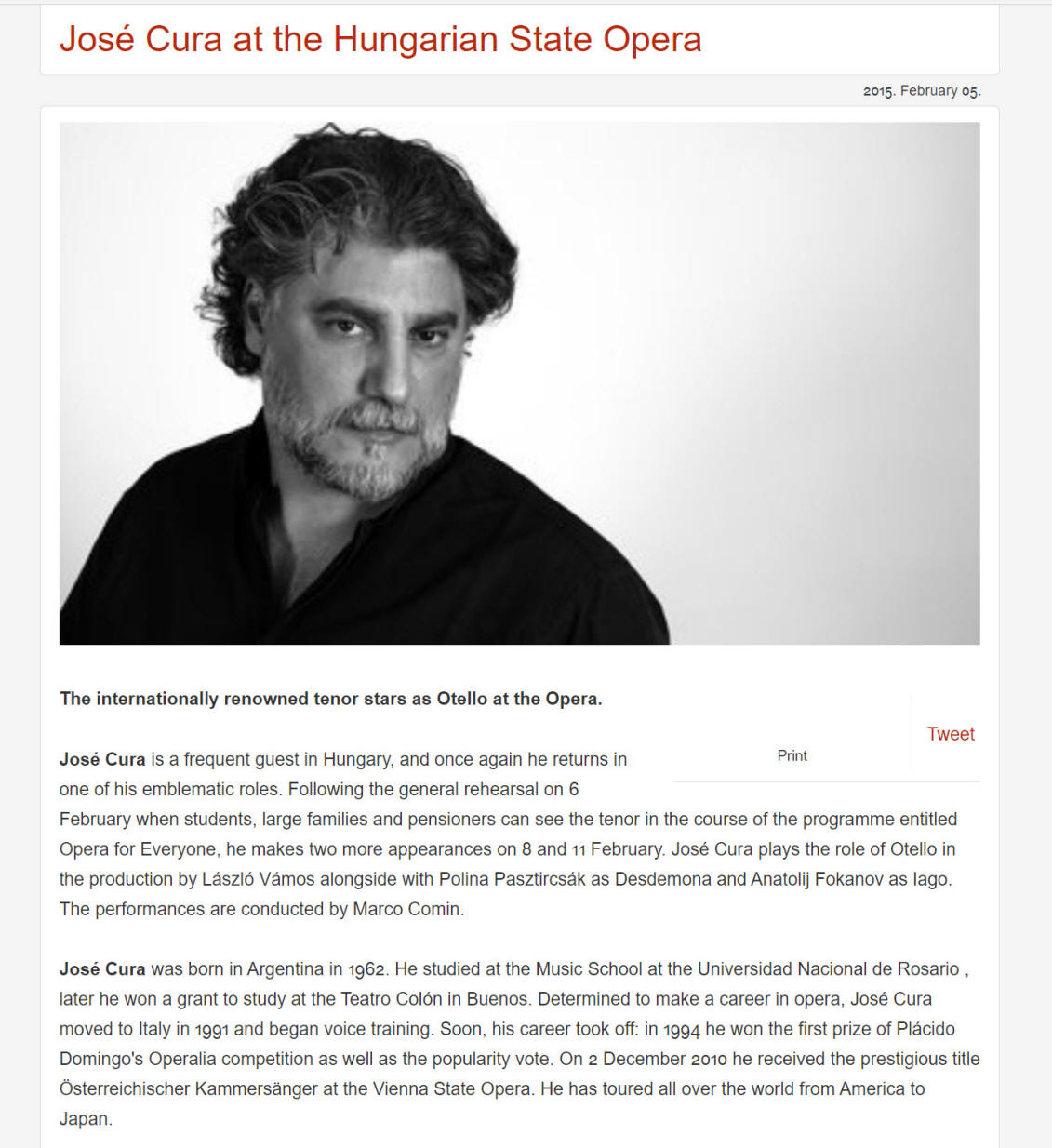
|
|
José Cura's Otello at the Hungarian State Opera House Opera Világ Gábor Bóka 8 February 2015 [Excerpt]
Audiences awaited José Cura's debut in the title role of Verdi's Otello as a miracle. We expected an outstanding performance from a big name, even if listeners who are up to date with opera life might have shaken their heads: foreign critics say that Cura is no longer at his peak... And those listeners could draw the conclusion, which is a result of both a sense of reality and an inferiority complex: he is still good enough for us. This is the fifteenth year that Cura has been back in Hungary: he first came here at the height of his international fame so it is hard to say that he has only just noticed this small corner of the map. The fact that a world star is a regular visitor to our country should be greeted with sincere satisfaction, regardless of any criticism: it can give us the false illusion that Hungary is part of the international operatic bloodstream - and sometimes it is good to dream. So there is no need to look for aggravating or exculpatory circumstances if we want to evaluate José Cura's current capability: it stands on its own. Let's see what we can learn from the performance on 8 February. First of all, the critic has a confession to make: despite the aforementioned decade and a half, this was the first time I had the opportunity to experience the Argentinean singer's art live; before this I had only had the chance to experience his work through recordings and radio broadcasts. These, however, do not seem to give a false picture of the main features of the Cura phenomenon: no one will ever accuse Cura of vocal perfection. Both the question of loose reading of the music and the technical shortcomings of his singing are legitimate. The latter, moreover, is closely linked to the problem of vocal range: Cura's high notes are severely limited - surely his performances will not be recorded in the golden book of operatic performance for the power and brightness of his exposed top notes. On the other hand, there is the natural beauty of the material. It is a matter of taste whether one prefers a lighter tone than Cura’s dark one but if one has no objection to this baritone version, one must admit that Cura's voice is beautiful in the middle and lower registers and if the high notes are partially done, then they become beautiful by the convincing delivery. All this, however, could be expected. But the star also had some surprises in store for us - a lesson in something that many of his less prestigious colleagues could learn from: artistic humility. Cura could have overwhelmed the whole thing in his powerful voice, and a sizeable part of the audience would have applauded him. He does not do this: in the love duet, the monologue in the third act or the opera finale, he sings with a thousand emotions, tones and dynamic nuances - constrained by his technical limitations but with maximum imagination, always in the service of expression. Even more pleasantly surprising was the singer’s acting ability: knowing the recording of a Barcelona production directed by Willy Decker, I was expecting a savage Otello, bordering on exaggeration, a kind of wild-man—but this seems to have been merely the realization of Decker’s directing instructions. What struck me this time was the way Cura can exist on stage without frills; everything he does gives the illusion of naturalness, even though it is obvious that his performance is the result of a long deliberation, a precise working out of proportions. So that's the inventory: the world star, temporarily stationed in our country, has given a performance that is far from flawless, but remarkable in many of its elements, and at certain moments, thanks to the weight of his personality, has been formidably performed. Where can we place him in the ranks of the great Otellos of the world, or even of his predecessors at the Opera House? It is hardly a question that can be answered with mathematical precision. What is certain is that, for the writer of these lines, Cura's many solutions will always be memorable, even if the performance as a whole falls short of others who provides a more complete experience overall. […]
|
||||
|
|
"I was Otello" - José Cura at the Opera House Operabemutatók 14 February 2015 11 February 2015 Performance [Excerpt] The anecdote persists that one of our illustrious writers, who once enjoyed more successful days, regularly introduced himself in his old age as “I was Ernő Szép.” For some reason, I was reminded of this in connection with José Cura's performance on 11 February. He played Otello with a physique befitting the role but with a make-up-less appearance and an anemic performance alien to the character. In László Vámos's staging, Otello's ship is already lurking on the director's right during the Storm Chorus, and before Esultate it is only pushed a good metre toward the middle. Then the victorious warlord comes in, throwing us something: a raspy tenor voice with a strong mid-range... The next time Cura returns, we're in the thick of the action, the ensign has done his job successfully, the people are sufficiently agitated. Our Otello silences the argument with a few sentences, then turns to Desdemona. This Otello paced back and forth, answering his wife moodily, without at any time showing any signs of emotion towards her. How long will he mark? we wonder. Otello does not show any particular fervor in the second act either. The singer(s) are cautious to the point of mezzoforte; Cura gives no more than is appropriate for a proper rehearsal. The Ora e per sempre addio monologue is hurried at about double-time, the poor conductor barely able to keep up. It is offered as if for no purpose at all: there are no emotions—or, if there are, just very basic ones. The singer's vocals are pleasant, supple, unemotional. The vengeance duet is reduced to a bland arm-waving... Cura offered his first forté [in Act III], only after Desdemona provoked it. I toyed with the idea that this was the concept, that Otello was just patiently enduring life and it is only when a woman angers him that he explodes. When he banishes Desdemona, he does so to great effect, violently belittling her. He slumps believably in his chair after the traumatic scene: the Dio, mi potevi monologue was the only part of Cura's performance that sounded balanced musically and in terms of the performance. It was at this point in the work that some kind of concept behind Cura's strange interpretation of the role was seriously suggested—this Otello just suppresses his temper until he suddenly bursts out with a primal instinct, although there is a difference between restrained temper and resigned passivity. But sadly, this feeling quickly disappears, because in the subsequent Iago-Otello-Cassio scene, Cura is back where he was before, handing over the performance to his partners. This sense was not helped by some flashy but shallow theatrical gestures in the last act. His performance of Otello's death was very effective, but I was terribly disturbed by his free use of the score. As he sweeps his gaze over his surroundings during "Oh! Gloria, Otello fu..." phrase, it brought a pensive contemplation of a singer who once was "Otello"... […]
|
||||
Otello - Wiesbaden - 2016
|
|
|
|
A Fabulous Review!
|
|
|
Rehearsal Photos by Sandra Ott
|
Otello in Barcelona
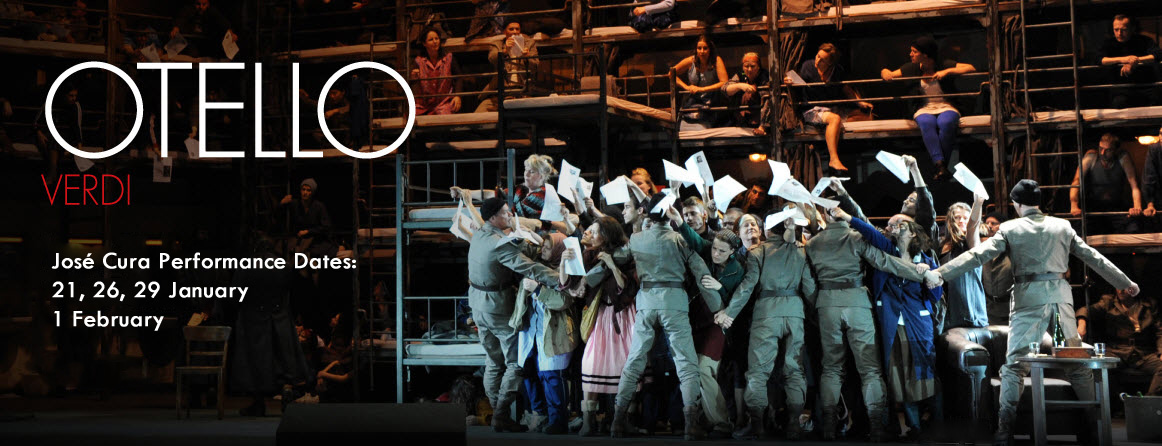
|
|
Theater: |
Gran Teatro del Liceu, Barcelona La Rambla, 51-59
|
|
|
|
||
| Promo Video: |
Click on photo above
|
|
|
|
||
| 2006 Liceu
Otello with José Cura
Video Excerpt
|
Click on photo above
|
|
|
|
| Cast: |
|
|
|
|
| Media |
|
|
|
|
|
|
|
|
|
General concept translation:
A new production of Giuseppe Verdi's Otello with tenor José Cura in the title role, comes to the Gran Teatre del Liceu with an impressive staging representing a refugee camp and incorporating a total of 85 beds on stage. With this work, directed by Andreas Kriegenburg and the musical direction of Philippe Auguin, the Barcelona opera institution opens a year of Shakespeare, combining this work in February with Rossini's version. The artistic director of the Liceu, Christina Scheppelmann, accompanied by Philippe Auguin, the Albanian soprano Ermonela Jaho who will be singing Desdemona, and co-director Claudia Gotta, discussed this work this afternoon... Gotta revealed that six years ago, when Kriegenburg started thinking about directing Otello, he saw the theme of war was essential and even influenced all relations that exist between the different characters, whether between Otello and Desdemona or between Otello and Iago. But as it is more difficult to show a battle on stage than in film, in the end he opted to "show the results of the war, including refugee camps"--a very topical issue today but not six years ago when this project was conceived.
|
.jpg) |
On this occasion, therefore, Otello will move between the beds of a refugee camp, but "the story is the usual one" with a protagonist who is an authoritarian, able to control every man while being unsure in his own life--a fact that will be by Iago. Desdemona and Emilia become volunteers and the rest of the characters are confined there after the war. This opera, produced by the Deutsche Oper Berlin, also has a major role for the children chorus.... Gotta commented they remain on stage throughout three acts because "Andreas Kriegenburg wanted to show how war can affect the young..." Soprano Ermonela Jaho, debuting as Desdemona, acknowledged that when she began working with the choir, she "shed tears because they make a very powerful work," without forgetting that "music is a universal language, capable of transmitting the power of the most powerful feelings like envy and love." Musical director Philippe Auguin stressed that Verdi organized everything "to maximize the intonation of the text," seeking "orchestral tempos and interventions that were ideal to highlight the role of the word."
|
.jpg) |
The work, which will run until the 7th of February, will have José Cura in the lead of some of the performances...
|
|
|
|
|
|
|
|
|
"My Otello has gained physical sincerity with age" José Cura, tenor, stars in 'Otello' at the Liceu La Vanguardia 15 Jan 2016 The Argentine-born tenor reprises the role of the moor of Venice in the version of Verdi opera which opens January 21 at the Teatre del Liceu.
|
|
|
|
|
|
|
|
|
|
|
|
|
|
José Cura: "Otello is a victim and reaches the age of 50 with an immature attitude" Vila Web ACN 19 January 2016
[Excerpt]
ACN Barcelona-The Gran Teatre del Liceu in Barcelona will kick off the celebration of the Shakespeare Year with Otello by Giuseppe Verdi, an opera directed by Andres Kriegenburg set in a refugee camp where the tragic story of love and deception between the protagonists unfolds. José Cura plays the gelós protagonist, a role he played at the premiere of the production at the Deutsche Oper Berlin. In a statement to ACN, Cura said that "Otello is a victim" who "reaches the age of 50 with an immature attitude". Cura has defined Otello as "a victim of everything he has lived through. When you reach the age of 50 and behave in a certain way, if you continue in the same way without having matured or measured, you have lived those 50 years in vain." He pointed out that when a person is a victim of some misfortune in his childhood, he has the possibility of maturing and overcoming the difficulties. On the other hand, he pointed out, "Otello reaches the age of 50 with an attitude of immaturity, accustomed to certain things and not knowing how to react". is a therapy that you have the alibi of being able to do certain things that would not close or in private life." In this sense, he explained that this is a complex character and recalled that Otello was used, victimized and abused. Regarding the staging in a refugee camp, Cura pointed out that sometimes it happens that when contemplating situations on stage or in a film if they are far from everyday reality "it seems that they happen in another world and it’s difficult to be emotionally touched." On this occasion, he pointed out that this opera is set in the context of a refugee camp and the behavior and body language are commonplace. After the initial confuison, if the audience embrace it, it will hit them harder because it's raw." Cura added that it is an important moment when an actor puts on the mask and gets into the skin of another character behaving and having a different attitude. "Putting yourself in someone else's shoes is one of the most fascinating things about being an actor, it's a therapy to have an alibi of being able to do certain things you would never do in your private life".
|
|
|
|
|
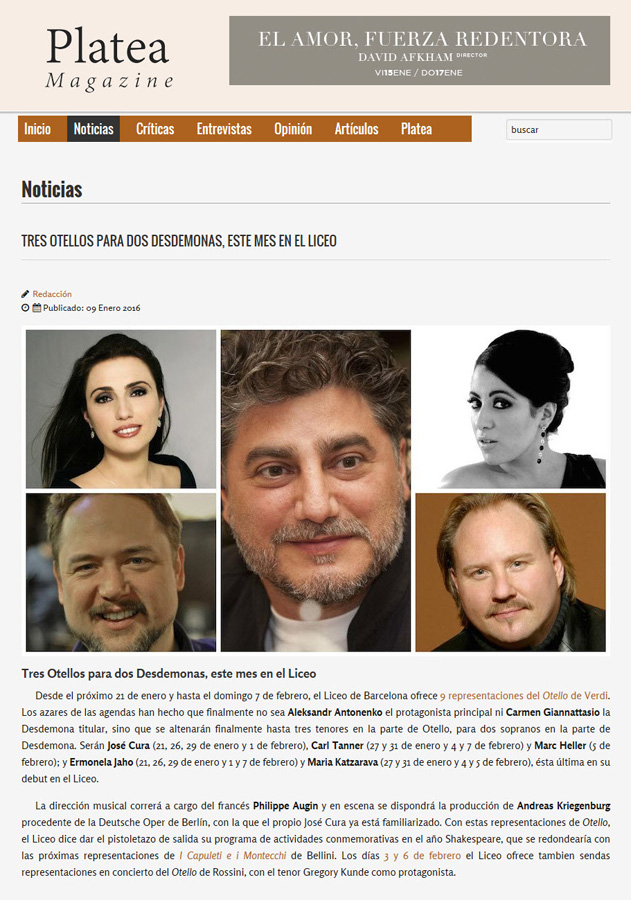
|
|
|
|
|
|
|
|
|
|
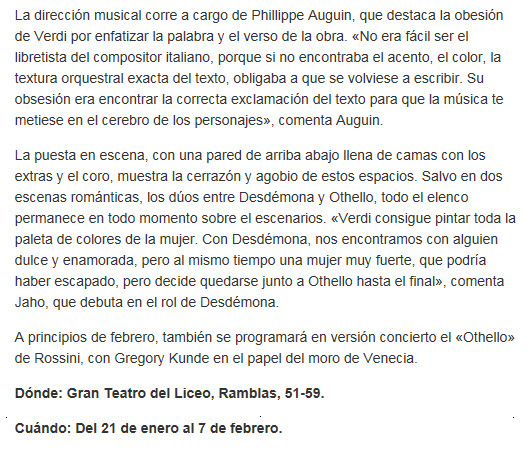 |
|
|
|
|
|
Videos Click on the Photos to view
|
Otello in Gyor -- Conductor
|
|
Next Year in Győr - Maestro Cura Conducts Otello!
|
José Cura: "Yesterday Night was a Massage for my Soul”
gyorplusz.hu Alexandra Zoljánszky Photo: Gábor Marcali 4 May 2015 translated by Zsuzsanna Suba "After a night of love, the most important thing is the next morning," said José Cura on Monday referring to the great success of the super concert of Sunday in Győr, in a press conference held at the home of the Győr Philharmonic Orchestra. The Argentine tenor had such a great time in our city that next year he will also perform here, but this time he won’t sing. "Beyond that, that we had a great concert yesterday, it also became evident that the new multifunctional hall of Győr, the Audi Arena is not only suitable for sports programs, but it can also be used to fill it with high culture," emphasized Géza Fűke, the director of Győr Philharmonic Orchestra. He added that the orchestra had play in front of two thousand people so far in Győr, but on Sunday night, however, they were able to reach 3500 people in this new location. The leaders of the orchestra also gave a taste from the next season of the orchestra during the press conference they held with José Cura. It was said that in the next season the musicians will prove, that classical music can be fun, entertaining and it can be consumed by anyone. Géza Fűke revealed that they would like to reach as many young people as possible in the next season. "Serious and boring are not synonymous words, classical music is very serious, but it is not boring at all!" began José Cura, who said that the orchestra of Győr aims at doing the same thing as he does, namely to gain joy to the audience. "The composers were cheerful people, but we play Mozart or Bach in a serious way, though Bach had 21 children ...We should talk about these in regarding to classical music, if we want to bring it to young people, since they are also very much alive artists!" he pointed out and he continued: "What we have created yesterday night, it was not only a beautiful moment of music, but it was also a great moment of the orchestra. That kind of relationship which was formed among the orchestra, me and the conductor could be called as a really special relationship, and the audience was smiling, and this is our mission. I can only congratulate the Győr Philharmonic Orchestra, and I am glad to be part of their next season, too," he stated and added that during the 30 years of his career he did what he had to, and now he only deals with those things what he likes. "This concert also belonged to this message and yesterday night was a massage for my soul." He also revealed that next year he is not going to sing, but he performs as a conductor with the Győr Philharmonic Orchestra; he will conduct Verdi’s Otello [in the Audi Arena, in a concert]. "We have to prepare the new generation of singers. Great young people will do their debut here, I will be the only old pirate on board, and it is a double pleasure for me that we will perform on the Shakespeare’s anniversary, who was one of the most humorous man,” he said, since the production will take place on the 400th anniversary of the death of the English playwright, on 23 April of 2016. "It was one of the most memorable concerts of my life on Sunday,” said conductor Kálmán Berkes, the artistic director of the orchestra and he added that he was confident that José Cura’s production of next season will also be sensational, where the Argentine star will be the manager. He emphasized, that guest conductors are very important; in addition to Cura, other stars will conduct the orchestra of Győr such as Zoltán Kocsis, Gilbert Varga and Kenichiro Kobayashi. The season program expands from Bach to Bartók and the works of contemporary artists can be also heard by the audience. Dávid Fekete, Vice Mayor, highlighted at the press conference that they dared to dream big, and the multi-functional hall was built, which can also serve the culture next to the sport. Speaking about the next season he said, that is important that the orchestra think about young people as well, and their young soloists can receive special role too. "The Győr Philharmonic Orchestra represents a serious part in the cultural life, and not only in our city but also outside of the country's borders. The local government of course will continue to provide all the support to the orchestra," he emphasized in the end. We will report about the 2015/2016 season in more detail to our readers. The photos of the concert of Sunday can be seen in our photo gallery which was made by Péter O. Jakócs. [http://gyorplusz.hu/galeria/10697.html].
|
|
|
|
|
José Cura conducts in Györ Hungary 09.03.2016 www.fidelio.hu The Györ Philharmonic Orchestra is waiting for his audience with the concert performance of the opera of Verdi’s Otello on the 400th anniversary of the death of Shakespeare, one of the greatest playwrights of all time, in the Audi Arena of Győr on 23 April. The peculiarity of the performance of one of the world's best known operas is that the legendary performer of the title role, the world-famous singer and conductor, José Cura will stand on the conductor’s podium, who is also well-known for the audience of Hungary and Győr. José Cura will be not only the conductor but the stage director of the show too including the creation of stage design and spectacle. The performance takes place with the participation of famous international and Hungarian opera singers. Christian Juslin will sing in the title role of the main protagonist of Otello, Gabrielle Philiponet will play Desdemona’s role, while Jago’s character will be shaped by Pierro Terranova, one of the prominent young opera singers of the Italian opera school. In the other roles well-known Hungarian singers, Zsófia Kálnay, Gergely Boncsér and Marcell Bakonyi appear on the stage. The Choir of The Hungarian National Philharmonic Orchestra will participate in the concert; their choir master is Csaba Somos.
Otello and José Cura in Győr, Hungary
09.03.2016 magyarnarancs.hu
The world-famous tenor grasps the baton. And if he grasped it, he won’t it let out of his hands, certainly not, until the end of Verdi’s Otello. But what made the great tenor to wink at the conductor's podium? A few years ago we asked this issue from him and it didn’t remain unanswered. Magyar Narancs: Why did become you interest in conducting after fifteen years of sumptuous singing career? José Cura: Originally I graduated in conducting and composing. Once I was living in the belief that I would lead the most famous orchestras of the world interpreting the works of my most admired composers mainly Beethoven, Brahms, Mahler and Rachmaninov. The voice training, singing, performing arts and theatrical self-expression came relatively late, around the age of thirty. Thus my path is completely differs from the one I planned, but now I hope to be one who grasp the baton at a certain stage of his career with the intention to renew that plan. His Otello performance of 1997 turned a great singer to a super star. He directed his own production of Otello in Buenos Aires recently. In light of all this it is beyond question that we will welcome a true Otello specialist in his person in Győr. In Otello’s role, Christian Juslin will sing, the French soprano Gabrielle Philiponet will play Desdemona, while Jago will be shaped by the Italian baritone Pierro Terranova.
|
|
World-renowned opera singer will conduct in Győr, Hungary
NOL 08.03.2016
The world-renowned opera singer returns to Hungary with a real curiosity: on the occasion of the 400th anniversary of the death of Shakespeare, he will dream Verdi’s legendary Otello onto to the stage with the contribution of the Győr Philharmonic Orchestra, the Choir of The Hungarian National Philharmonic Orchestra and renowned international and Hungarian singers. José Cura – who charged in the awareness of classical music with the title role of Otello nearly two decades ago – does not like to be categorized as an opera singer who happens to conduct. After all, the situation is just the opposite: originally he graduated in conducting and composing and then “incidentally” became one of today's most popular, most sought-after star tenors. Accordingly the conducting activity has become more and more prominently present in his career for the last fifteen years now, and he has more often acts as stage director in recent years as well. most recently directing his own Otello production in his native Argentina. The 53-year-old artist knows every vibration of this piece since he sang the title role of Otello more than two hundred times (in countless conception, including two different productions in Hungary). It can be said without exaggeration that this role has become his trademark in the opera business. He is used to be called as the ”fourth tenor" by many people (referring the master trio of Domingo, Pavarotti and Carreras), but he always humbly rejected this flag. A series of particularities characterizes the upcoming production of Győr. An adapted concert version of the drama will be seen on the Arena’s stage on 23 April. It will be directed and conducted by José Cura, who is also in charge for the stage design and directing. (It is known in the professional circles, that he is a multitalented artist.) Therefore a very special reading of this opera of inexhaustible depth and dramatic content is expected from the Maestro in his usual “holistic” artistic approach. Even we can speak about “the evening of favorites”, since Shakespeare – as we know from the biographers - was Verdi's favorite writer, and Verdi is one of Cura's favorite [opera] composer, as he confessed countless times. The composition of the singing team also promises exciting synergies with a combination of Hungarian and foreign talents. The Finnish Christian Juslin has been cast in the role of Otello, the French soprano Gabrielle Philiponet sings Desdemona, Iago will be played by the Italian baritone Pierro Terranova. The Hungarian singers will be represented by mezzo-soprano Zsófia Kálnay, Gergely Boncsér who currently plays Cassio’s role in the Hungarian Sate Opera and the bass-baritone Marcell Bakonyi. The music is provided by the aforementioned Győr Philharmonic Orchestra, with which the star tenor gave an exciting concert last year in Győr. The Choir of The Hungarian National Philharmonic Orchestra led by their choir master, the Liszt Prize winner Csaba Somos will also contribute. The Argentine Maestro will prepare for this monumental event in Győr during an intensive one-week long rehearsal. |
|
José Cura will perform again in Győr, Hungary
MNO 10.03.2016
José Cura, one of today's most popular opera singers, will conduct Otello in Győr on 23 April. It is not a surprising role for the Argentine tenor, since it is well-known that he doesn’t like being pigeon-holed as an opera singer sometimes conducts. He originally studied conducting and composing and only later, in his late twenties, started singing professionally. Renaissance man “It is a very dangerous road on which humanity acts now. They kill the spirit of the Renaissance, which defined intellectual progress for centuries. Today the expectation is that we know or cultivate only a narrow area of the world and knowledge. And this is true not only for the art. If someone acts differently, then he or she would be severely criticized. ” – said José Cura to Kultúrgrund in a previous interview. His natural talent was soon discovered and shortly afterwards he won the Operalia singing competition founded by Plácido Domingo; he has since become one of the most sought-after tenors of the world. Over the last fifteen years, however, he has come home more often to his original vocation. José Cura considers Verdi a favorite composer but he has a particularly sensitive relationship with Otello. In fact he became a super star thanks to his Otello performance in 1997 and he performed the title role of this opera more than two hundred times yet. In 2008 in Szeged - on the occasion of his first full opera performance in Hungary – he also chose this Verdi's work to perform; he also sang the role at the Hungarian State Opera of Budapest last year. Cura is a returning guest in our country; he gave a highly successful concert with Andrea Rost in Győr last year in May. Then he vowed to return again this year: on 23 April he will conduct Verdi’s Otello in a concert performance again with the Győr Philharmonic Orchestra, in the Audi Arena of Győr. Moreover, Cura is not only the conductor but also the stage director of the show. In the role of Otello is the Finnish tenor Christian Juslin, Desdemona’s role will be performed by French soprano Gabrielle Philiponet, and Iago will be shaped by the young Italian baritone, Piero Terranova.
|
Press Conference Announcing Otello in Concert in Györ
|
|
|
|
|
"We developed a close partnership" Revizor Kis Éva
|
|
Press Conference Photos
|
|
|
José Cura is in Hungary
MNO 14/04/2016
|
Promotional Material
|
Click photo above to watch
|
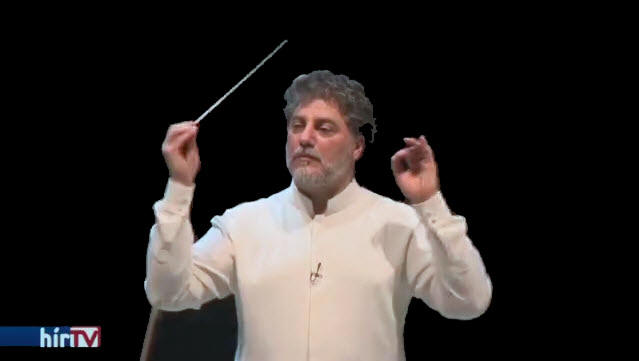
Click photo above to watch |
|
|
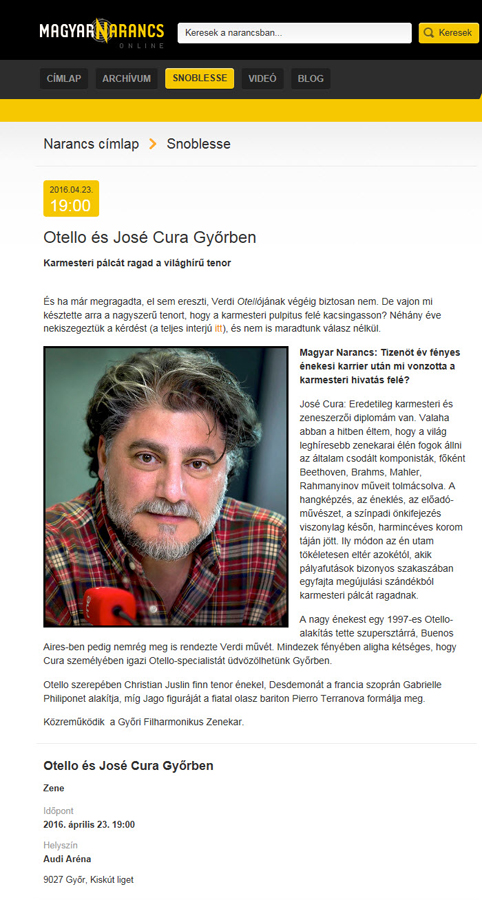 |
|
|
Reading Shakespeare from a Score Bors Online 11 March 2016
|
|
|
|
||
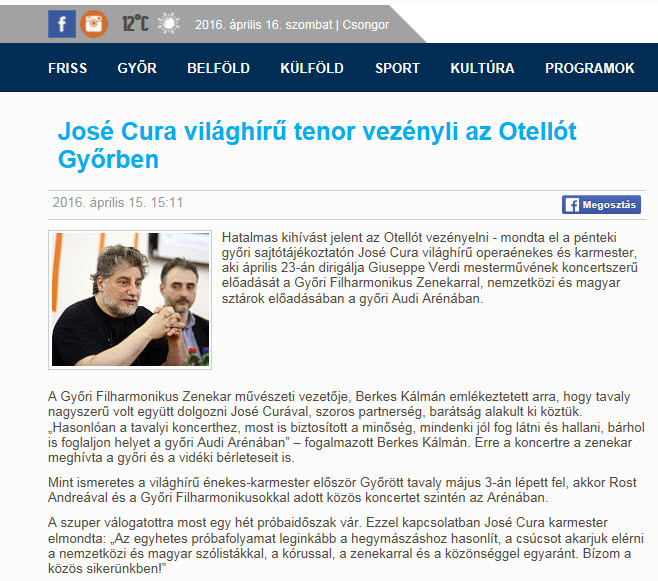 |
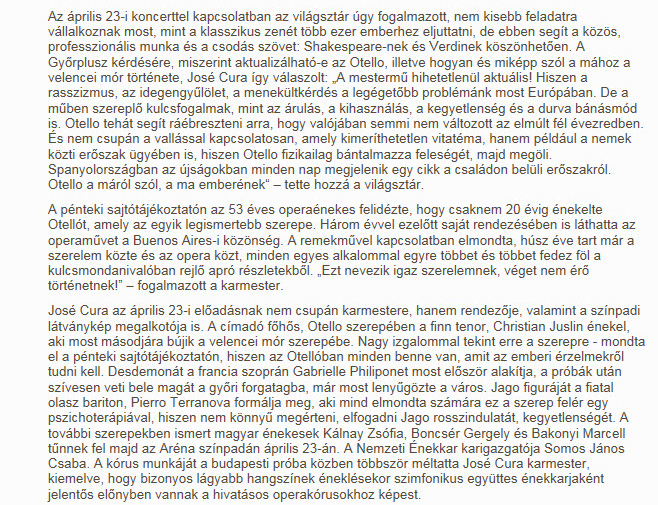
|
||
|
|
|||
|
|
|||
|
Rehearsal Photos
|

|

|
|
|
|
|
José Cura world-famous tenor: “It is a huge challenge to conduct Otello”
source: MTI published: hir.ma 15/04/2016
“It is a huge challenge to conduct Otello” –said José Cura world-famous tenor to MTI. He conducts the concert performance of Giuseppe Verdi’s masterpiece with the Győr Philharmonic Orchestra in the Audi Arena of Győr. The Argentine tenor held a rehearsal with the Hungarian National Choir – which also contributes to concert the chorus master is Csaba Somos – in an extremely good atmosphere on Thursday in the Palace of Art (MÜPA) in Budapest. After the rehearsal José Cura reported to MTI that it didn’t often occur that they were laughing so much while working under his leadership. On the other hand, some humorous remarks usually help the musicians and singers to relax during the several hours of rehearsals which mean great strain for them.
José Cura is considered as being one of the best tenors of our time. He performed on the opera stage for the first time in Verona in 1992. Two years later he won the Operalia international singing competition founded by Plácido Domingo. The young tenor was mentioned as being the new star of the 1990s and he was invaded by many contracts and also celebrated by the audience of Paris, London, Milan and New York. In 1997 he earned enormous success in the title role of Otello in which Claudio Abbado conducted the orchestra of Berlin Philharmonic. José Cura have sung Otello’s role more than 200 times during his career.
|
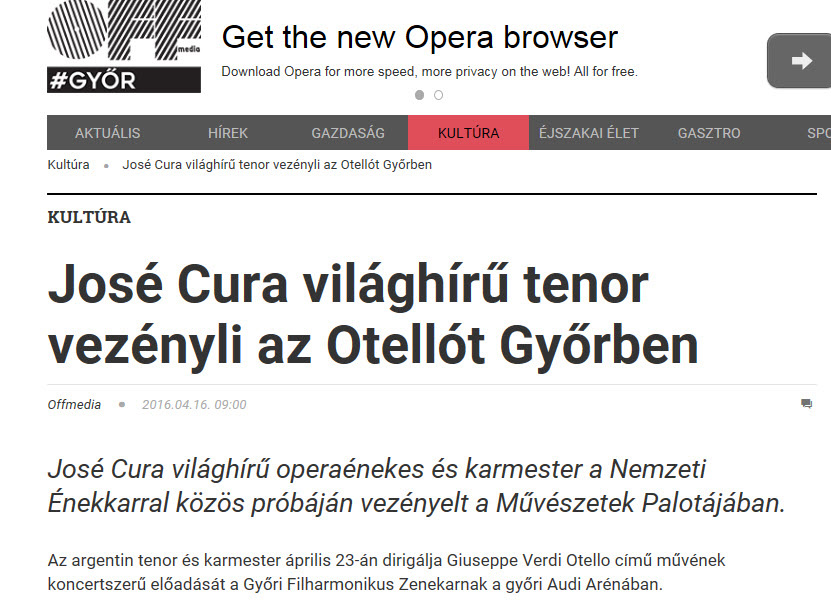
|
|
|
|
|
|
|
|
|
|
INTERVIEWS!
|
|
|
|||||||
|
||||||||
|
|
||||||||
|
||||||||
|
|
.jpg)
|
|
|
|
|
||
|
|
.jpg) |
|
|
||
|
|
||
|
Rehearsal
|
Pure Joy and Happiness!
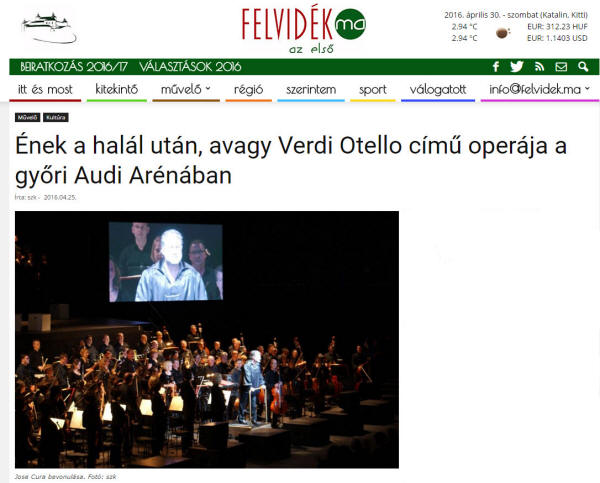 |
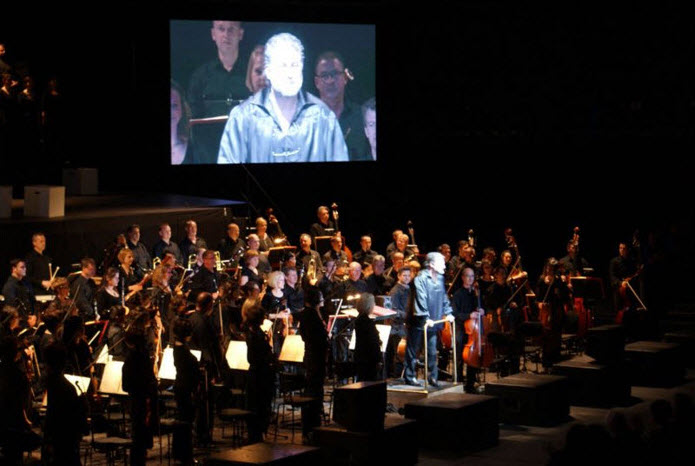
|
|
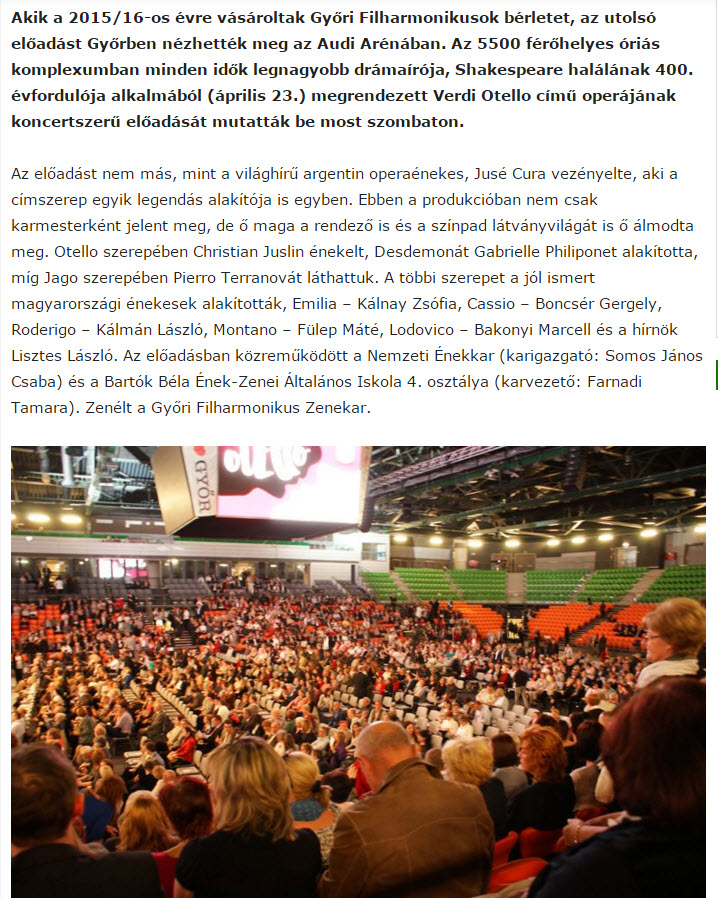
|
|
|
|
|
|
|
|
|
Last Updated: Sunday, September 08, 2024 © Copyright: Kira